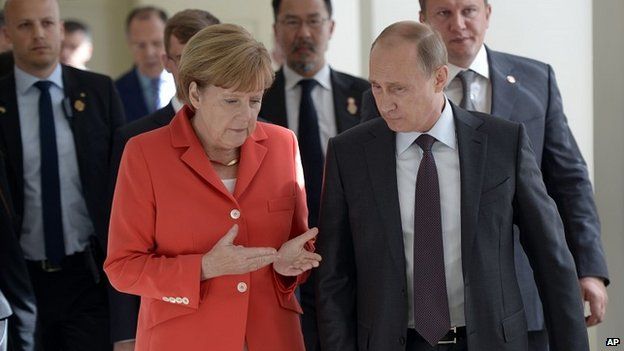Germany and Russia's contradictory relationship
- Published

Germany and Russia have a more complicated relationship than perhaps any other pair of countries. It is full of contradictions and tugs in different directions.
On the one hand, the Soviet Union liberated Berlin in 1945 but, on the other hand, then dominated East Germans for most of the next half century.
East Germans (like Angela Merkel) grew up learning Russian in school, and Russian officials in Germany (like KGB officer Vladimir Putin) mastered the German language. They speak the same tongues.
The two economies need each other. Germany manufactures the industrial chemical products and the machinery that Russia needs to modernise its economy, as well as the cars which rich Russians like to drive (or have driven for them by chauffeurs).
And Russia produces the gas on which the German economy relies (particularly as Germany moves away from nuclear power).
Economic ties
On the latest figures, Russia is Germany's eleventh biggest export market, with exports adding up to just under $50bn (37bn euros; £29bn) last year (around about half what Germany exports to Britain).
And Germany is Russia's seventh biggest buyer of goods and services (about the same as Britain).
So Russia is not Germany's biggest customer nor is it the biggest supplier to the German economy - but it is substantial.
Germany gets about a third of its oil and gas from Russia and about a third of the European Union's exports to Russia come from Germany. So switching off trade (not that anybody is suggesting going that far) would hurt German companies and German citizens (as it would Russian enterprises and Russian citizens).
On one estimate, 10% of German exporters trade with Russia, and for most of those firms, Russia provided a substantial chunk of their business - more than they could lose painlessly.
In contrast, the trade the other way is dominated by a few Russian companies. Earlier this year, Germany's economy and energy minister, Sigmar Gabriel, warned that there was "no sensible alternative" to Russian oil and gas.
He added that even in the Cold War, the Soviet Union didn't turn this particular tap off. Might, he did not ask, Mr Putin change that policy?
Diplomacy first
Angela Merkel has already said that Germany would review its sources of energy in the light of the crisis in Ukraine, pointing out that Germany was not as dependent on Russian oil and gas as were other countries in eastern Europe.
Fathoming her view is hard. Despite what is sometimes said outside Germany, it is widely accepted in Germany that the events in Ukraine and Russian policy have horrified her. It is too close to the doorstep.
But, as a scientist, she maintains a pragmatic view. She is not one for the grand gesture so she keeps the lines open to President Putin in the belief that he might be won round - though she has not discarded the stick of sanctions (even if wielding the stick will hurt Germany, too).
But she has powerful lobbyists whispering against sanctions in her ear. The heads of Adidas, Siemens and ThyssenKrupp have all expressed big unease about tougher sanctions and questioned whether Western leaders had mis-handled the relationship with Mr Putin.
The guest list for President Putin's recent birthday party had a substantial German contingent, not least former German Chancellor Gerhard Schroeder, who was pictured hugging Mr Putin.
Mr Schroeder is chairman of the shareholder committee of Nord Stream, a pipeline company owned by the Russian energy company Gazprom. Meanwhile former chancellor Helmut Schmidt said that Russia's actions in the Crimea were "completely understandable".
'Justified revenge'
The emotional ties between Russia and Germany are hard to unravel. The two countries do, after all, inhabit the same part of the world. And some remember the Soviet Union as liberators of Berlin rather than oppressors of East Germany.
The columnist Christian Neef wrote that it was "time to stop romanticising Russia".
"Russophiles are fond of saying that the West badly slighted Russia during the 1990s and that Moscow is now taking justified revenge for its defeat in the Cold War," he said.
"But those who say this are overlooking the fact that it was Western Europe that pushed the hardest at the time for the IMF and the World Bank to provide $40bn in loans to Moscow. At the time, the oil price had fallen to $17 and Russia otherwise would have slipped into an economic catastrophe".
And he concluded: "Germany is currently scratching its head over the best way to deal with Russia in the future. If we don't finally take a sober look at Russia, one that is erased of all romanticising and historical baggage that distorts our view of Putin's world, then we will never succeed in finding a reasonable strategy".
Two factors now muddy the waters. The shooting down of the civilian jet certainly seems like a game-changer, while the revelation of American spying on German politicians and citizens makes Germans less likely to go along with whatever Washington wants.
- Published22 July 2014
- Published21 July 2014